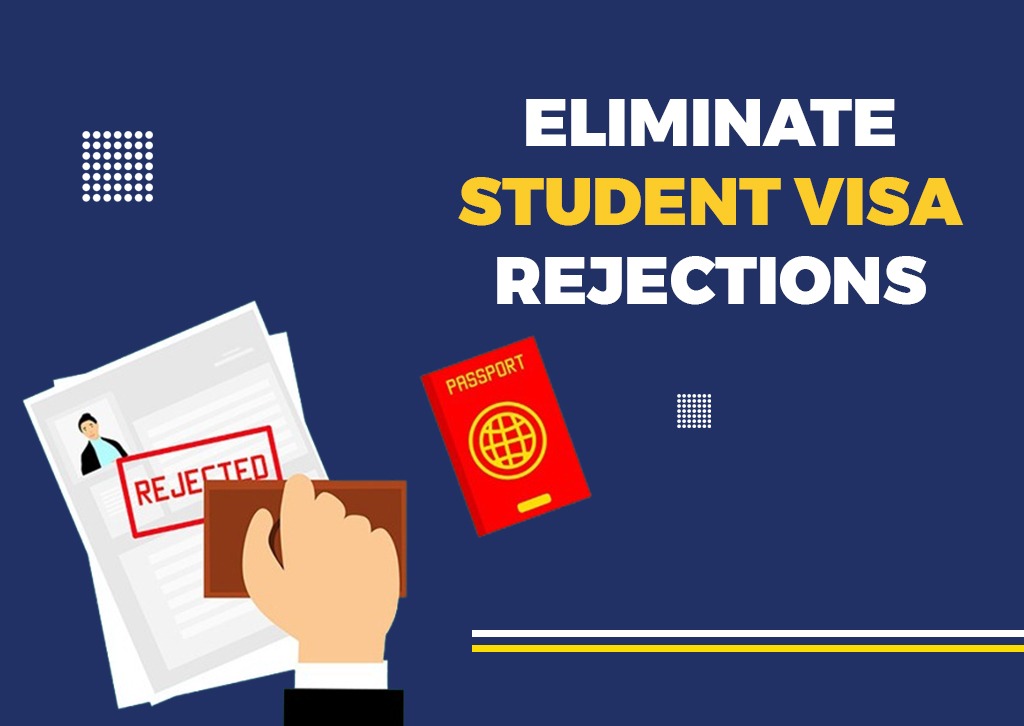When you’re planning to study abroad, obtaining a student visa is one of the trickiest tasks. The visa interview can be daunting, but understanding what the interviewers are looking for can improve your chances of success. This blog post delves into the main reasons why student visas get rejected, what the interviewers are actually looking for, and how you can present yourself effectively and maximize your chances of success.
Why is the Visa Interview Important?
The visa interview is a key part of your study abroad journey. It’s not just about checking documents—it’s about gauging your intentions, your plans, and your ability to complete your studies abroad successfully so that your experience is most fruitful for you and your fellow students.
Purpose of the Visa Interview
- Verify Intentions: Ensure that you genuinely intend to study and return after your course.
- Assess Financial Stability: Confirm that you have the financial means to support yourself during your studies.
- Evaluate Language Proficiency: Check that you can communicate effectively in the language of instruction.
What Are They Looking For?
Visa officers are looking for evidence that you are a genuine student, that you will return to your home country after your studies, and that you have the financial and academic ability, and seriousness to complete your course.
How to Clearly Demonstrate What They’re Looking For
- Genuine Intent to Study
- Showcase Academic Goals: Clearly explain why you chose the course and how it fits into your long-term career plans.
- Provide Evidence of Previous Studies: Highlight any relevant academic or professional experience.
- Financial Stability
- Present Bank Statements: Provide recent, clear, and detailed financial documents.
- Explain Sources of Funds: Be ready to explain how you plan to finance your education, including scholarships, loans, or family support.
- Ties to Home Country
- Demonstrate Family or Business Ties: Explain any responsibilities or commitments that will bring you back home after your studies.
- Career Plans in Home Country: Discuss how you plan to use your education in your home country.
Example of How to Demonstrate Intentions
| Scenario | Effective Response |
| Why do you want to study in the USA? | The USA has the best programs in my field of data science, which directly aligns with my career goals in India’s growing tech industry. |
Top 6 Mistakes That Lead to Visa Rejection
- Inconsistent Information
- Mistake: Providing conflicting details in your application and interview.
- Solution: Double-check all documents and be consistent with your statements.
- Inadequate Financial Documentation
- Mistake: Failing to provide sufficient proof of funds.
- Solution: Present clear and comprehensive financial statements.
- Weak Ties to Home Country
- Mistake: Not convincing the officer that you will return home.
- Solution: Emphasize your commitments, like family or career plans in your home country.
- Unclear Study Plans
- Mistake: Not having a clear reason for choosing your course or institution.
- Solution: Be specific about why you chose the course and how it fits into your future.
- Poor Communication Skills
- Mistake: Struggling to answer questions clearly and confidently.
- Solution: Practice your responses and work on your language proficiency.
- Lack of Preparation
- Mistake: Not preparing for the interview, leading to poor answers.
- Solution: Research common questions and practice with a friend or mentor.
What to Do Instead
| Mistake | What to Do Instead |
| Inconsistent Information | Double-check all details before submission. |
| Inadequate Financial Documentation | Provide detailed and clear financial records. |
| Weak Ties to Home Country | Highlight strong family or career ties. |
Common Reasons for Visa Rejection and Acceptance
Example 1: Financial Stability
- Rejected: Applicant failed to show clear proof of funds and gave vague answers about financing.
- Accepted: Applicant provided detailed bank statements and clearly explained the sources of funds, including a scholarship.
Example 2: Study Intentions
- Rejected: Applicant gave unclear reasons for choosing the course, saying it was recommended by friends.
- Accepted: Applicant explained how the course fits into their career plans in their home country.
Example 3: Ties to Home Country
- Rejected: Applicant was vague about plans after graduation, saying they “might” return home.
- Accepted: Applicant outlined a detailed plan to return and work in a family business or pursue a career.
Common Rejection and Acceptance Scenarios
| Reason | Rejected | Accepted |
| Financial Stability | I have enough money.” No documents to back it up. | Provided bank statements, and explained sources of funds. |
| Study Intentions | My friend recommended this course. | This course is key for my career in the growing tech field. |
| Ties to Home | I might return home. | I will return to take up a role in my family business. |
Getting your student visa approved requires more than just submitting the right documents. It’s not just having genuine intent; it is about clearly showing through words and documents that you have genuine intent, capability, financial stability, and ties to your home country. Re read this article several times before you go for your Visa interview.
Take help from professionals. Peak Trust Consultants, your trusted abroad consultants in India, are here to guide you and take you through several rounds of practice till you are completely confident. Call us NOW to make a dent in the Universe.



